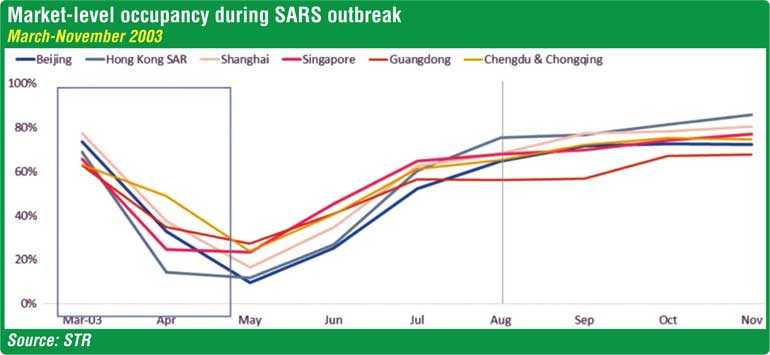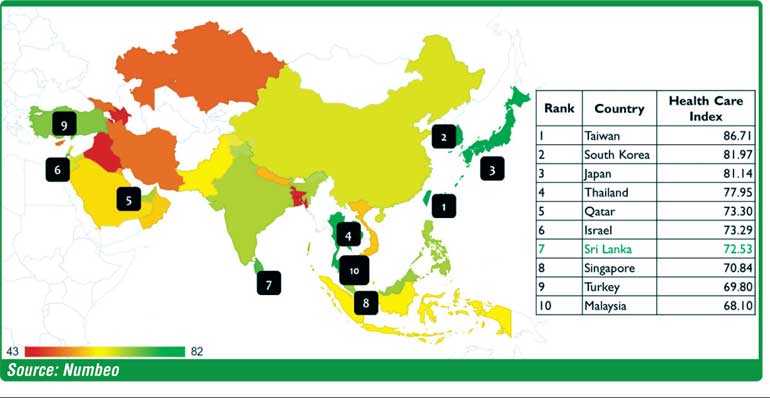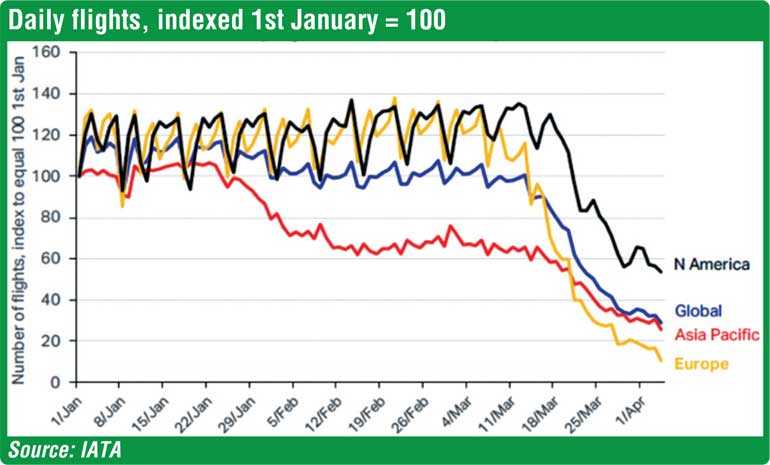Wednesday Feb 18, 2026
Wednesday Feb 18, 2026
Wednesday, 20 May 2020 00:00 - - {{hitsCtrl.values.hits}}
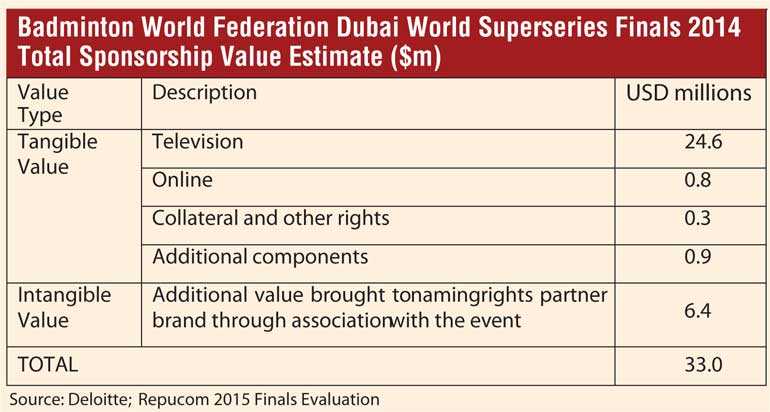
By Eventistry Ltd.
Sri Lanka’s travel and event industries have had more than their fair share of challenges in the past couple of years. While 2018/’19 brought localised crises that could have been overcome with time, in 2020, we are facing a challenge that is unlike anything the world has witnessed in living memory. 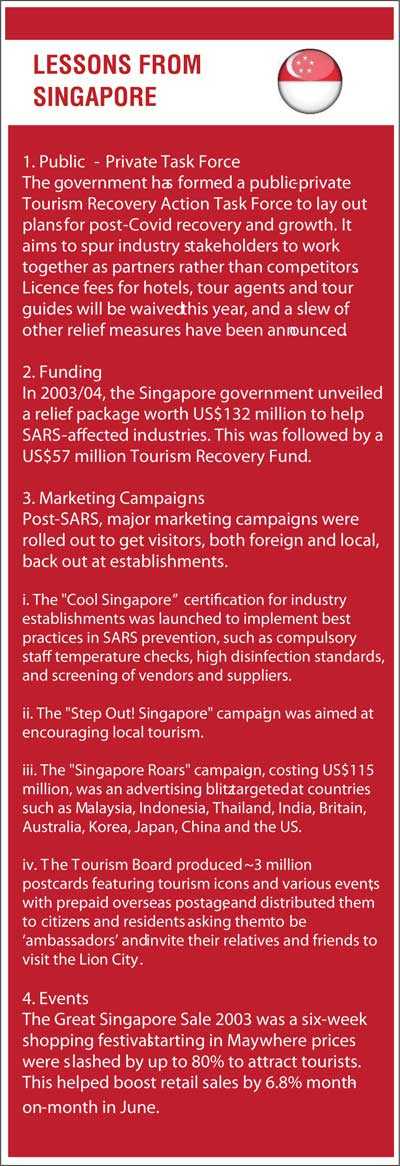
Just as the Bubonic Plague in the 14th century altered the very structure of society in Europe, we will see many things change for good across the globe—we can expect a ‘new normal.’ The ones who will be able to thrive in this new reality will be those who maintain a positive outlook and accept that change can be a force for good.
Preparing for a world that will be forever changed by COVID-19 will require all of us to think, plan and act differently. Certainly, in our personal lives, and even more so as businesses needing to face common threats. The losses to the tourism industry, not just here but worldwide, will be steep and protracted.
To have any chance of recovery, we have to forget about business as usual. The lack of coordination and petty rivalries that have plagued our industry cannot remain. There will be no point in airlines assuring customers of sterilisation efforts if hotels don’t do the same; checking body temperature at airports will be useless unless there are proper (perhaps even luxurious) facilities where visitors can be treated.
The bottom line is that we will need a concerted effort as a country, with every single business in hospitality, events and travel – both direct and indirect – doing their bit in a thoughtful manner. Yes, businesses will always compete, and that will not change. But we will not be able to bounce back from this without each doing our part.
There is a role for everyone to play; not just the government and the companies with deep pockets, everyone. In fact, change and adaptability are far easier for businesses that are small and agile. And as ever, what remains unchanged are our natural resources – the evergreen beauty of our country and the resilient ingenuity of our people.
So Sri Lanka
Sri Lanka has many advantages to help us compete in the new normal.
1. Island in the sun: We may often take for granted the 1,300 km of beaches we are blessed with, but they are not just touristy clichés to be carelessly tossed into brochures. Before creating the next advertisement, event or tour experience, really imagine what fresh, balmy sea breezes will mean to those who have been confined to their homes for a long period, during winter. Consider that in the first week since lockdown was eased in Denmark, foot traffic to beaches, marinas and parks went up by 127%. Such open spaces, which we have plenty of, will be important in enticing wary travellers who still want to practise some social distancing. After being cooped up inside, the importance of sport and exercise will be reinforced in people’s minds, and sports tourism will have extra appeal in the post-COVID new normal.
2. How to save a life: Travel insurance was not always taken seriously by young travellers, but in the new normal, we can expect comprehensive insurance to become essential. The state of the healthcare system in a country will also factor more heavily into travel decisions. Sri Lanka’s public health system has long been the pride of South Asia, and the fact that the COVID-19 death toll here has been low will also inspire confidence. A global healthcare index that ranks countries based on the overall quality of healthcare infrastructure and staff as well as commensurate cost, ranks Sri Lanka at #21 globally (ahead of countries like Switzerland and Canada), and at #7 in Asia and the Middle East (ahead of Singapore and Malaysia).
3. Something good can work: Another much-discussed factor in foreign travel blogs, which may seem trite to us, is the easy-going and resilient nature of our people. In any problem, the attitude taken toward resolving it can make as much of a difference as the material resources thrown at it. Our never-failing smiles, dogged optimism and inventiveness have been much lauded on the cricket field, but these are traits that not just cricketers but folks across the country have in spades. This was demonstrated recently when Eventistry hosted Sri Lanka’s first online talent competition – It’s Me Sri Lanka. Hundreds of entries during the COVID-19 curfew gave testament to the artistry and positive attitude of our people. We already have the talent and creativity to take us forward in the new normal; to help create events and content that connect us, attracting people to our island and putting a smile on their faces.
A challenge like no other
By no means however, should we downplay or make light of the enormity of the challenges facing us. The statistics are grim. Global flights were down 70% from 1 January to 1 April. This drop is reflected in the monthly tourist arrival figures in Sri Lanka for March 2020 compared to March 2019.
The World Tourism Organization expects about one-third of international tourism receipts, $300-450 billion, to be lost in 2020, while the Asian Development Bank estimates that Sri Lanka could lose $107-319 million in tourism revenue. The immediate hit will be compounded over the medium- and longer-term, as it will take time for people to feel comfortable traveling again.
This is why creativity and collaboration are needed now more than ever. Low hotel rates alone aren’t going to be enough to convince people to travel – there will be low rates all over the world and a race to the bottom isn’t necessarily going to help us survive, certainly not thrive. Crises are the best time to be innovative and we need to collaborate to create options that have never been offered before.
There will need to be strong pull factors for tourists, both foreign and local. Thus, sporting and other events will be vital in drawing the numbers. Sports followers are amongst the most die-hard travellers, and young sports fans are especially likely to get back to traveling sooner rather than later. However, we need to also be sensitive to the very valid fears that people will have about the risks of infection in crowded places. With that in mind, we need to design all events in collaboration with the medical community.
As a starting point, we can learn from other countries that have done well after similar outbreaks (although it must be noted that no country has faced anything of this magnitude before). During the SARS outbreak in 2003, Singapore’s tourist arrivals fell by 19% year-over-year, hotel occupancy rates went as low as 10%, and Singapore’s tourist industry lost an estimated $30-50 million overall.
It took eight months after being declared free of SARS for the industry to rebound in Singapore. This recovery was carefully engineered however, and not just left to chance [see box ‘Lessons from Singapore’ for further details].
For all the affected Asian markets during that outbreak, it took six to nine months from the outbreak for hotel occupancy rates to bounce back.
We can expect the recovery from COVID-19 to take longer than that of SARS, due to its wider spread. Each player in the industry must rise to the occasion to innovate in its own unique way, as well as contribute to the reassurances that can be given by the entire industry and country. We make some suggestions here for both public and private sector players but believe this is just the beginning of what must be a coordinated effort by us all.
Suggestions for the SL Government
Fiscal related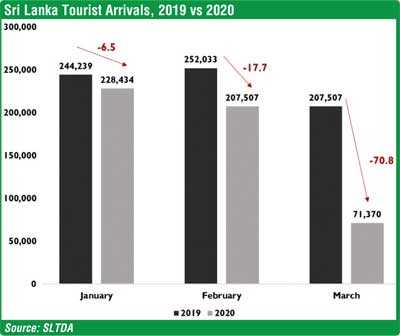
1. The six-month moratorium on bank loans was a welcome relief. Further stimulus for the country’s tourism sector will be needed to ensure post-COVID recovery. For instance, the Myanmar government has announced a stimulus package for its tourism and apparel sectors with nearly $70 million worth of loans, eased deadlines for tax payments, and tax exemptions.
2. Postpone or abolish fees for issuance or renewal of tourism-related licenses for 2020. Grant a refund for those who have already paid such fees in 2020. Fully or partially waive annual liquor license fees.
3. Our airport tax is high compared to regional airports (~$50 compared to Changi’s $36). This fee should be reduced in future, and a complete waiver must be considered for 2020.
4. Enforce visa-free travel for all countries for the remainder of 2020.
5. Allow special grants and tax exemptions for event/tour organisers that schedule sporting or other events that draw a minimum of 75 foreign tourists (with proper medical advice and social distancing guidelines being followed at the event).
6. Allow special grants and tax exemptions for event/tour organisers that schedule sporting or other events that draw a minimum of 200 local tourists (with proper medical advice and social distancing guidelines being followed at the event).
Innovation- and event-related
7. Currently, Sri Lanka Tourism has a very rigid event evaluation criteria, which is not practical in many cases, especially in evaluating media outcome. The current evaluation system requests the organisers to commit to media outcome prior to an event being approved, and organisers will only be paid based on what is committed. However, this model works well only for paid campaigns and traditional media partnerships. Events (especially global ones) usually work on earned and shared media value (i.e., based on global media picking up the event and reporting on it). The evaluation process must certainly be based on relevance, credibility, and past track record, but it is recommended that the event evaluation process be amended to be more in line with the global norm for media outcome for events by adopting the PESO model [Paid media, Earned media, Shared media, Owned media], which most international events utilise.
8. For instance, when calculating the total sponsorship value of the 2014 Badminton World Federation Dubai World Superseries Finals, which attracted 5,000 spectators over five days, the authorities did not rely only on traditional evaluation methods. The intangible benefits were also calculated, as one of the main goals in hosting this event was promoting Dubai and highlighting its sporting capabilities and attributes.
9. Immediately set up a task force with representation across the sector to plan and operationalise strategies to aid in the recovery of the tourist and event sectors. There should be particular emphasis on ways to increase innovation and collaboration within the sector. This task force should also set uniform guidelines on ways to ensure the health and protection of both employees and visitors, with special emphasis on implementing and monitoring adherence.
10. Set up a central portal where all relevant resources and guidelines can be accessed. Data from #12 should also be stored here (in a secure manner). Public or crowd-sourced help can also be solicited here in order to monitor adherence to guidelines at various establishments.
11. Introduce smart immigration counters and add more self-check-in kiosks at the airport to minimise contact.
12. Use available infrastructure at Mattala and Ratmalana airports to allow for low-budget carriers to operate in and to stagger arrivals at BIA. The first group of overseas travellers will likely be younger age groups that prefer to use low-budget carriers.
Disease-related
13. Temperature checks and rapid COVID-19 testing to be made available at airport. A streamlined set of guidelines for all airport employees to follow, and clear protocol to transfer any positive-testing travellers to recovery/quarantine centres in a hospitable and efficient manner.
14. Work with software developers and mobile service providers to implement a private automated contact tracing app that all tourists and locals will be encouraged to install. Ensure privacy standards are adhered to and offer exclusive discounts via the app to ensure downloads. This same app can be used to link immediately with emergency health or security services.
15. Set and strictly enforce guidelines for restaurants and bars. For example, seating to be 50% of normal capacity, all employees to wear masks and gloves. Enforce strict carrying capacity limits at all major tourist sites such as Yala or Sigiriya.
16. At all tourist sites, require employees to wear masks and gloves. Wherever possible, introduce electronic ticket vending machines that minimise contact.
17. Require all establishments catering to tourists to register with the SLTDA (with a grace period for payment) and strictly crack down on all unlicensed operators/establishments, in order to ensure that the implementation of sanitation guidelines can be monitored effectively.
Suggestions for the private sector
Innovation- and event-related
1. Develop Augmented Reality (AR) experiences to pique interest during lockdown, and ultimately draw tourists interested in adventure sports who are unafraid to face risks. It is likely that the first tourists to venture out will be the high-adrenaline, low-budget experience travellers. AR can help people imagine what you may not even be able to experience in real life―abseiling down the face of Sigiriya or paragliding toward the mystical shadow of Adam’s Peak on the forests below...Even Sri Lankans who have visited these places many times would love such experiences, and they can pique the interest of those who haven’t visited the real places, yet. While lockdown is ongoing, this may be the only way to travel, but we will remain top of mind when people are ready to actually travel again. Given that Sri Lanka has a very talented pool of developers, building cutting-edge AR/VR experiences can be a way in which private technology companies and the SLTPB can collaborate.
2. Develop other digital tools, such as audio guides or self-check-in kiosks, that will help minimise contact across the industry. Digital and marketing expertise can also be utilised in developing virtual exhibitions and festivals to sustain interest in Sri Lanka as a destination. Other Asian nations such as Thailand and Singapore have already developed such attractions. After the cancellation of Art Central Hong Kong due to COVID-19, the organisers teamed up with Artsy to host an online edition of the event, which will run longer and offer greater opportunity for collectors and participating galleries to interact.
3. Events will be the best way to attract tourists in some scale. After many months of being cooped up at home, more people will have reinforced ideas on the importance of exercise and sport. Active sports tourism events where people can participate as individuals, while maintaining social distancing if they wish, will be attractive. The plethora of beach activities that Sri Lanka has to offer will also pave the way for surfing and other water sports competitions. Examples of world-famous competitions that could be held here are Tough Mudder and Global Kitesports Association, Professional Windsurf Association and World Surf League calendar events, etc.
4. While mass stadium sporting events may not be attended to the same degree as in the past (at least until a vaccination is found), with sensible social distancing guidelines, major sport fans could be enticed to travel to Sri Lanka. Sporting events would be ideal to kickstart our post-COVID recovery, as sport teams have a strong and loyal fan base to whom event attendance would be an easier sell. The focus should be on media-based events that will build credibility and excitement about Sri Lanka as an overall destination.
Niche segment-related
5. Health and wellness will be top of mind for many people after this period of reflection and change. Curate packages that accommodate small groups to experience a holistic wellness experience using our many Ayurvedic and meditation/yoga resources.
6. There has been a lot of reflection on the lower levels of pollution since the lockdowns and the amount of damage that is done to the environment by the tourism industry. Without shying away from this issue, as an industry, we should also reflect and build in ways to work with travellers on carbon offsets within the new normal. Part of their curated experience can be travelling to national parks/forest boundaries where they can plant trees and also sign up for the maintenance of a plot of reforestation.
7. Authorities must support and promote developing unique local event initiatives that have longevity and can be developed into a brand property.
8. Provide concessionary rates for those with student ID and/or under 25 years of age, as this group will be most likely to travel first post-COVID.
9. Develop packages where a core group of travellers (especially nuclear family) can ‘rent entire villa,’ ‘rent entire floor,’ etc. to reassure of lower risks of infection.
Marketing-related
10. Continue to invest in thoughtful promotion and simple trip planning tools for potential travellers. For example, Greece has launched a ‘Till Then, Stay Safe’ campaign urging international travellers to “#staysafe” while using this time in lockdown to continue planning for a trip to their stunning islands. Portugal strikes just the right note with its reflective and hopeful campaign – advertising the country subtly and beautifully while acknowledging the unique moment in time that we are all in together.
11. Specific marketing campaigns to attract tourists from China, which is already in the recovery phase and where many polls indicate overseas travelling could begin as early as July.
12. Specific marketing campaigns to attract local tourists once curfew restrictions are relaxed.
13. Run social media campaigns where continued brand engagement, as well past brand loyalty, can make followers eligible for discounts and promotions that can be availed once markets re-open.
14. Use social media marketing to attract ambassadors for Sri Lanka from a wide range of citizenry and expatriates with Sri Lankan affiliations, not just influencers (similar to Singapore’s postcard campaign).
Staff-related
15. Negotiate with private sector education and IT service companies to provide training and up-skilling for tourism sector employees during this lull period, with hotel stay or other industry vouchers (with extended validity period) being provided in lieu of monetary payment.
16. Set protocols in place, in consultation with medical experts, to ensure minimal disease transmission risk for both staff and customers once business reopens.
References
https://gen.medium.com/how-the-black-death-radically-changed-the-course-of-history-644386f5b803
https://www.iata.org/en/iata-repository/publications/economic-reports/covid-19-wider-economic-impact-from-air-transport-collapse/
https://sltda.gov.lk/pages/monthly-tourist-arrivals-reports
https://www.unwto.org/impact-assessment-of-the-covid-19-outbreak-on-international-tourism
https://www.warc.com/newsandopinion/news/singapore-puts-focus-on-post-coronavirus-tourism-recovery/43224
https://www.jcu.edu.sg/news/releases/coronavirus-outbreak
http://www.china.org.cn/english/travel/76802.htm
https://skift.com/2020/03/06/are-singapores-tourism-players-creating-a-model-for-a-post-virus-world/
https://str.com/data-insights-blog/looking-back-sars-outbreak-and-hotel-performance-recovery
https://www.weforum.org/agenda/2020/04/augmented-reality-covid-19-positive-use/
https://www.pwc.com/lk/en/assets/COVID-19-Impact-on-Sri-Lanka-PwC.pdf
https://www.google.com/covid19/mobility/
https://www.numbeo.com/health-care/rankings_by_country.jsp?title=2020®ion=142
https://www.imf.org/en/Topics/imf-and-covid19/Policy-Responses-to-COVID-19#S
https://www.irrawaddy.com/news/burma/myanmar-unveils-70-million-stimulus-package-ease-economic-blow-virus.html
https://www.thepapare.com/x30-asia-cup-2018-final-races/
https://roar.media/english/life/sponsored/the-x30-asia-cup-2018-comes-to-sri-lanka/
https://www.sc.edu/uofsc/posts/2020/03/covid_impact_simon_hudson.php#.Xq2F1agzY2w
https://youtu.be/70tcUNgd8IM
https://skift.com/2020/03/26/5-tourism-promotion-campaigns-hitting-the-right-notes-in-a-crisis/
https://www.timeout.com/singapore/art/the-best-virtual-art-exhibitions-to-explore-from-your-couch
https://www.adsoftheworld.com/collection/covid19_ads
https://www2.deloitte.com/content/dam/Deloitte/uk/Documents/sports-business-group/deloitte-uk-sbg-dubai-falcon-report.pdf
